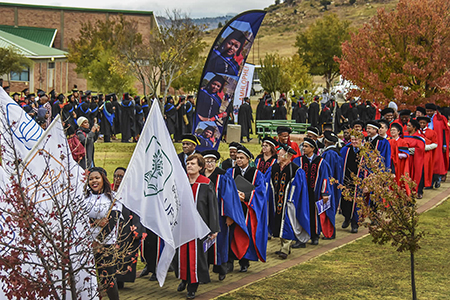
Photo: Ian van Straaten
Photo Gallery
Video
Qwaqwa Campus kicked off the 2017 graduations season of the University of the Free State in style when over 550 degrees and certificates were conferred in three sessions on 12 and 13 May 2017. These included five PhDs from the Faculty of Natural and Agricultural Sciences.
In his maiden speech delivered during the two ceremonies on Friday 12 May 2017, the newly-appointed Vice-Chancellor and Rector, Prof Francis Petersen, emphasised the interconnectedness of graduates with other stakeholders in their communities.
“Never forget the role played by other people who sacrificed a lot for you to be here today. Recognise the extra mile that someone was willing to go for you to graduate,” he said to an enthusiastic audience that included Grade 12 learners from neighbouring schools.
Prof Petersen also reminded the graduates that not everybody had an opportunity to enter, enrol, and eventually graduate at a university. “You are part of the privileged few, and I am confident that the UFS has given you an equal opportunity to reach your full potential. You have had years of exposure to ideas and experiences on diversity. You now have the opportunity to show the world and to use what you have learnt beyond a classroom,” he added.
“Go out there and open doors for others as much as they were opened for you. I implore you to carry over your experiences of diversity and use them to build a better world. Go out there and build a better world, not only for yourself but for everyone in need. Expand your influence, reach out, and be accountable,” he said.
“South Africa needs your skills,
innovation, knowledge, expertise,
and creativity.”
Make your own unique contribution
The session held on Saturday 13 May 2017 saw the Principal of Motheo TVET College and Qwaqwa Campus alumnus, Dipiloane Phutsisi, having a heart to heart with the graduates from the Faculty of Education.
“Our contribution to the world as graduates will not be measured by the wealth we accumulate or the accolades we receive, but rather by the way in which we share our unique gifts with the world. And the only place to find those gifts is to look within yourself. As the class of 2017, make your own unique contribution,” she said.
“Your graduation takes place at a particularly challenging time in the history of our democracy. It happens at a time when our nation is engulfed by racial polarisation, anger, confusion about what democracy and freedom mean to us, and at a time when the pillars of morality are tested.”
“As you graduate, I wish to remind you that our country needs you more than ever before. South Africa needs your skills, innovation, knowledge, expertise, and creativity,” she said.
Three members of the current SRC were also among the graduates. They are the President, Njabulo Mwali (BSc Information Technology), Sports Affairs Officer, Ntokozo Thango (BA Sociology), and Student Development and Environmental Affairs Officer, Ntokozo Masiteng (BA Sociology).